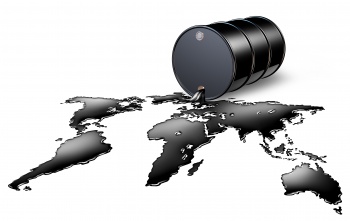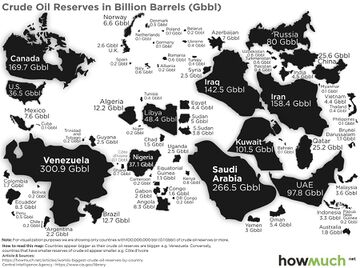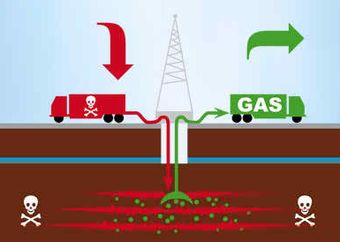Difference between revisions of "Oil"
(Important topic...) |
m (→Oil reserves) |
||
| (8 intermediate revisions by one other user not shown) | |||
| Line 1: | Line 1: | ||
{{concept | {{concept | ||
| − | | | + | |wikipedia=https://en.wikipedia.org/wiki/Petroleum |
| + | |sourcewatch=http://www.sourcewatch.org/index.php/Oil_industry | ||
|image=oil.jpg | |image=oil.jpg | ||
| + | |nndb=https://www.nndb.com/topics/780/000175255/ | ||
|image_width=350px | |image_width=350px | ||
| − | |description=The commodity which occupies a uniquely defining role in 20th and | + | |description=The commodity which occupies a uniquely defining role in 20th and 21<sup>st</sup> century geopolitics due to its commanding importance for all modern military and commercial ventures. |
| + | |constitutes=energy source | ||
}} | }} | ||
| + | '''Oil''' is a viscous, black, highly [[energy]] dense material which is used both as a fuel and as a raw material for production of a wide range of chemicals such as plastics and pesticides. It is naturally occurring but limited to a relatively few areas of the world, of which the most important, historically, has been the [[Middle East]]. In the 21st century, "non-conventional" methods have been developed to extract oil from [[tar sands]]. These methods are highly polluting to the natural environment. | ||
| + | |||
==Official narrative== | ==Official narrative== | ||
| − | Nothing to see here, move along... | + | {{YouTubeVideo |
| + | |code=ySnk-f2ThpE | ||
| + | |caption=A recommended video by [[James Corbett]] | ||
| + | }} | ||
| + | It's black, sticky, goes in cars. Nothing to see here, move along... | ||
| − | == | + | ==Oil reserves== |
| − | The [[Persian Gulf]] region of the [[Middle East]] has a much larger proportion of the conventionally available petroleum that anywhere else in the world. Other countries with large reserves (such as [[Libya]]) have also been targeted by the US in a bid to maintain supplies. | + | [[image:Oil reserves.jpg|left|360px]] |
| + | The [[Persian Gulf]] region of the [[Middle East]] has a much larger proportion of the conventionally available petroleum that anywhere else in the world. Other countries with large reserves (such as [[Libya]] and [[Venezuela]]) have also been targeted by the US in a bid to maintain supplies. | ||
==Historical importance== | ==Historical importance== | ||
| Line 17: | Line 27: | ||
==Recent developments== | ==Recent developments== | ||
| − | Technology has more or less failed to come up with a replacement for petroleum. | + | [[Technology]] has more or less failed to come up with a replacement for naturally occurring petroleum, although decreased attention to the natural environment allowed oil extraction rates to keep increasing up to 2015.<ref>https://www.indexmundi.com/energy/?product=oil&graph=production</ref> |
===Fracking=== | ===Fracking=== | ||
{{FA|Fracking}} | {{FA|Fracking}} | ||
| + | [[image:Fracking.jpg|left|340px]] | ||
Hydraulic fracturing, or 'fracking', is touted as a way of increasing accessible reserves, but in practice involves some risk of earthquakes and more importantly, has a track record of poisoning the groundwater rendering it undrinkable. It is banned outright in several countries, and would not be legal without the [[Cheney Loophole]], a provision [[Dick Cheney]] inserted into the the [[Federal Energy Policy Act of 2005]] to circumvent the [[Safe Drinking Water Act]] by exempting fracking fluids.<ref>http://cleanwater.org/page/fracking-laws-and-loopholes</ref><ref>http://www.huffingtonpost.com/kevin-grandia/how-cheneys-loophole-is-f_b_502924.html</ref> | Hydraulic fracturing, or 'fracking', is touted as a way of increasing accessible reserves, but in practice involves some risk of earthquakes and more importantly, has a track record of poisoning the groundwater rendering it undrinkable. It is banned outright in several countries, and would not be legal without the [[Cheney Loophole]], a provision [[Dick Cheney]] inserted into the the [[Federal Energy Policy Act of 2005]] to circumvent the [[Safe Drinking Water Act]] by exempting fracking fluids.<ref>http://cleanwater.org/page/fracking-laws-and-loopholes</ref><ref>http://www.huffingtonpost.com/kevin-grandia/how-cheneys-loophole-is-f_b_502924.html</ref> | ||
| Line 28: | Line 39: | ||
==References== | ==References== | ||
{{reflist}} | {{reflist}} | ||
| − | |||
Latest revision as of 10:49, 29 November 2021
(energy source) | |
|---|---|
 | |
| Interest of | • Mordechai Abir • Committee for the Liberation of Iraq • Halliburton • Sijbren de Jong • Walter Levy • Oilgeopolitics.net • Oxford Institute for Energy Studies • Petrochemical industry • Tim Reilly • Russia/Deep state • Shell • Daniel Yergin |
| The commodity which occupies a uniquely defining role in 20th and 21st century geopolitics due to its commanding importance for all modern military and commercial ventures. | |
Oil is a viscous, black, highly energy dense material which is used both as a fuel and as a raw material for production of a wide range of chemicals such as plastics and pesticides. It is naturally occurring but limited to a relatively few areas of the world, of which the most important, historically, has been the Middle East. In the 21st century, "non-conventional" methods have been developed to extract oil from tar sands. These methods are highly polluting to the natural environment.
Contents
Official narrative
| A recommended video by James Corbett |
It's black, sticky, goes in cars. Nothing to see here, move along...
Oil reserves
The Persian Gulf region of the Middle East has a much larger proportion of the conventionally available petroleum that anywhere else in the world. Other countries with large reserves (such as Libya and Venezuela) have also been targeted by the US in a bid to maintain supplies.
Historical importance
As warfare and business were increasingly mechanised, the importance of oil as the most convenient fossil fuel was quickly apparent.
After WW2, the leaders of Saudi Arabia reached agreement with the US government to maintain supply to the US in return for support staying in power.[1]
Recent developments
Technology has more or less failed to come up with a replacement for naturally occurring petroleum, although decreased attention to the natural environment allowed oil extraction rates to keep increasing up to 2015.[2]
Fracking
- Full article: Fracking
- Full article: Fracking
Hydraulic fracturing, or 'fracking', is touted as a way of increasing accessible reserves, but in practice involves some risk of earthquakes and more importantly, has a track record of poisoning the groundwater rendering it undrinkable. It is banned outright in several countries, and would not be legal without the Cheney Loophole, a provision Dick Cheney inserted into the the Federal Energy Policy Act of 2005 to circumvent the Safe Drinking Water Act by exempting fracking fluids.[3][4]
Tar Sands
Tar Sands, rebranded 'oil sands' by the public relations industry, are semi-liquid forms of rock with a high petroleum content. On paper, these vastly increase supply of oil, but since the energy return rate on extraction is very low (perhaps 1:3 instead of 1:20 or 1:100 for conventional oil), the extraction process is extremely damaging to the environment.
Related Quotations
| Page | Quote | Author | Date |
|---|---|---|---|
| Midge Decter | “We're not in the Middle East to bring sweetness and light to the world. We're there to get something we and our friends in Europe depend on. Namely, oil.” | Midge Decter | 21 May 2004 |
| Nieuwsuur | “I'll pump everything out of the ground of what I can get out of the ground to meet the demand” | Ben van Beurden Shell | |
| Petrodollar | “I am saddened that it is politically inconvenient to acknowledge what everyone knows: the Iraq war is largely about oil.” | Alan Greenspan | 2007 |
| Donald Trump | “Islamic terrorism is eating up large portions of the Middle East. They've become rich. I'm in competition with them. They just built a hotel in Syria. Can you believe this? They built a hotel. When I have to build a hotel, I pay interest. They don't have to pay interest, because they took the oil that, when we left Iraq, I said we should've taken” | Donald Trump | June 2015 |
| US/Foreign policy | “Anybody who believes that a country's internal democracy is the determining factor in whether the West decides to move for violent regime change in that country, is a complete idiot. Any journalist or politician who makes that claim is more likely to be a complete charlatan than a complete idiot. In recent years, possession of hydrocarbon reserves is very obviously a major factor in western regime change actions.” | Craig Murray | January 2019 |
Related Documents
| Title | Type | Publication date | Author(s) | Description |
|---|---|---|---|---|
| Document:Meeting Note Moscow Stock Exchange Forum | seminar description | 12 June 2017 | Integrity Initiative | II, probably Victor Madeira or Perry Fawcett, attended a Russian business forum in London |
| Document:The Geo-Politics of the Strait of Hormuz | webpage | 8 January 2012 | Mahdi Darius Nazemroaya | |
| Document:Washington Wants Syria's Oil | Article | 30 August 2017 | Anna Jaunger | The future of Syria and its geopolitical strategic equation will depend on who controls the oil-rich region of Deir al-Zor. |
| File:Timor-oil.pdf | letter | 2001 | Ramiro V. Paz | The Timor Gap Treaty versus an East Timor Exclusive Economic Zone: Economic Independence for East Timor |

